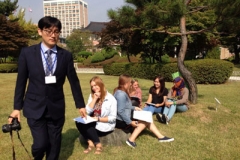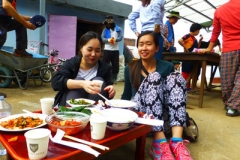March 3, 2017
This article is from the Spring 2017 issue of Mission Crossroads magazine, which is printed and mailed free to subscribers’ homes three times a year by Presbyterian World Mission.
The moment the teachers said they wanted to take pictures of the Americans, I got nervous. There was a Korean-language contest that we weren’t part of, but they wanted our pictures—or rather, I thought, my white housemates’ pictures. This type of near unabashed racial selection isn’t uncommon in Asia, and for universities, I knew that looking international and showcasing their diversity was good for their reputations. The only problem was that in Korea my Chinese face didn’t look diverse. My roommate, Emily, assured me she wouldn’t let them leave me out.
When the day came for the photo shoot, after an introduction in the auditorium, my housemates and I lined up with people of various un-Korean-looking ethnicities, which included an unusual amount of white people for the area. The Chinese students, who were a majority of our class, along with a few students of other Asian nationalities, were not invited to participate in these photos. I stood nervously, making sure I knew where my housemates were in case I got left behind, waiting for the other shoe to drop and for a teacher to call me out of line. But no one did.
We all went out to a grassy field between the university buildings, where they handed out signs spelling out a sentence in Korean. One section held nine squares that created a photo of King Sejong, the ruler who created the Korean writing system. I was surprised they hadn’t pulled me out yet, and thought perhaps it was just too awkward to call out one person. Perhaps I was just hyper-aware of race at this point, but I noticed that a dark-skinned Filipino man was asked to hold the very center sign, which covered his face completely. It hurt to watch. After finally getting the shot they wanted, the photographers asked my roommates, Linda and Emily, to be in another photo shoot. They, along with a few other female students, posed with clipboards for a Korean-language contest promo, despite not being part of the contest. Once all that was finished, we took photos with just our class without the fancy photographers—and with Chinese students included.
The Americans took some time to reflect on the experience together. These types of things happen everywhere, even in the U.S., though the roles may be slightly different. I wasn’t unselected as I feared and I had the privilege of being in the photo, but my fears were not baseless. We had made none of the choices. It was outside our control in a culture not our own. My roommates did not victimize me with their whiteness and had stood by my side through it all. They had a chance to experience what it was like to be “exoticized”—an experience that no doubt opened their eyes to being “othered.” However, what they did not experience was a shift in power dynamics. They still carried their white privilege with them, getting preferential treatment for the color of their skin. This was a common theme throughout the year, and one common to most international YAVs.
In a predominantly white program, my experience seems like the exception, but it is not. The greater Asian-American community has echoed many of my experiences of being abroad. I am not always a minority, and I am not always the one on the lower end of the power dynamics, especially with an American passport. These kinds of experiences have granted me eyes to see shades of gray beyond black and white—to see the Filipino man hidden in the photo and my Chinese classmates waiting alongside while we got our photos taken.
I appreciated my roommates listening to my fears and standing by my side, but most important, I appreciate when they too can see what I see. I’m proud to have been part of a program that values my experience and looks out for me as my roommates did, though the work is far from done. To create an inclusive space in missions will mean putting in the hard work of listening and being constantly vigilant about others’ experiences beyond our own.
Alyson Kung, alumna of the Young Adult Volunteer program (Korea, 2015–16)
Today’s Focus: Mission Crossroads Spring 2017 edition
Let us join in prayer for:
PC(USA) Mission Co-workers
Kurt Esslinger, Korea
Hyeyoung Lee, Korea
John Fletcher, Democratic Republic of Congo
Gwenda Fletcher, Democratic Republic of Congo
PC(USA) Agencies’ Staff
Edward Thompson, BOP
Mark Thomson, PMA
Let us pray:
Gracious God, as we grow, may we feel your presence in our lives. As we discover who we are, give us strength to go out into the world and share the gifts you have given us. Amen.
Daily Readings
Morning Psalms 22; 148
First Reading Deuteronomy 7:12-16
Second Reading Titus 2:1-15
Gospel Reading John 1:35-42
Evening Psalms 105; 130
![]() You may freely reuse and distribute this article in its entirety for non-commercial purposes in any medium. Please include author attribution, photography credits, and a link to the original article. This work is licensed under a Creative Commons Attribution-NonCommercial-NoDeratives 4.0 International License.
You may freely reuse and distribute this article in its entirety for non-commercial purposes in any medium. Please include author attribution, photography credits, and a link to the original article. This work is licensed under a Creative Commons Attribution-NonCommercial-NoDeratives 4.0 International License.
Categories: Mission Yearbook
Tags: asian-american community, korean language, mission crossroads, mission yearbook, teachers

